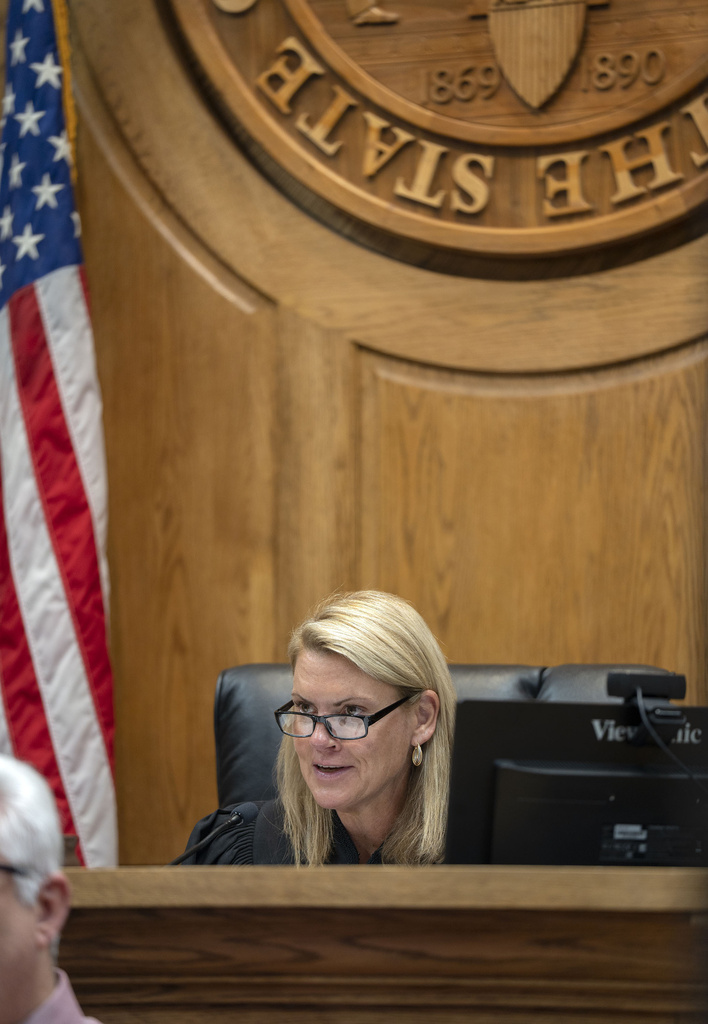Wyoming’s First-in-the-Nation Medical Abortion Ban Temporarily Blocked
Judge Melissa Owens again ruled in favor of abortion rights advocates
- Published In: Politics
- Last Updated: Jun 23, 2023

Wyoming's first-in-the-nation medical abortion ban was temporarily blocked on Thursday by a Teton County Judge. (AP Photo/Charlie Riedel, File)
By Jacob Gardenswartz
Special to the Wyoming Truth
A state judge temporarily blocked enforcement of Wyoming’s first-in-the-nation medication abortion ban on Thursday, ensuring the most popular form of pregnancy termination would remain accessible while lawsuits over legislators’ attempts to ban it work their way through the legal system.
Shortly after 4 p.m. M.T., Ninth District Court Judge Melissa Owens granted a temporary restraining order barring enforcement of Senate File 109, the first state law in the nation that explicitly prevented the prescription, sale and use of medications to induce abortion. Owens had previously granted orders blocking similar measures that banned most abortions regardless of method.
Ruling from the bench at the conclusion of a two-hour hearing, Owens thanked attorneys on both sides for what she described as “outstanding” briefing and arguments. Yet she concluded the plaintiffs had “clearly met their burden” to have the law blocked, noting they showed probable success on the merits of the case and demonstrated that at least some plaintiffs would suffer “possible irreparably injury” were the law allowed to take effect on July 1.
Julie Burkhart, President of Wellspring Health Access — which operates one of the last-remaining abortion centers in Wyoming and is a plaintiff in the case — celebrated the decision in a statement shared with the Wyoming Truth.

“We are grateful and relieved that medication abortion will remain legal in Wyoming. Medication abortion is safe, effective, and has been approved by the [Food and Drug Administration] for more than two decades,” Burkhart said. Noting the organization’s Casper facility is now finally operational after an arson last year delayed its opening, Burkhart said Owens’ order will help the facility “continue providing medication abortion care unimpeded to the patients who seek it.”
Protection for popular pills
Medical abortions accounted for over half of all pregnancy terminations in the U.S. in 2020, per the Guttmacher Institute. All but one of the 220 abortions which took place in Wyoming from 2019-2021 utilized medications, according to data from the Wyoming Department of Health.
During debate over the proposed medication ban legislation earlier this year, lawmakers clashed with doctors and other medical experts about the safety of the medications and the impact of banning them on patients.
Though legislators supporting the bill tried to argue abortion medications posed significant risks to women taking them, numerous peer-reviewed studies have shown the opposite: that such medications are safe and effective, with fewer risks to patients than other popular drugs like ibuprofen and penicillin.
Representatives for the plaintiffs highlighted this point during Thursday’s hearing, arguing that with the near-total abortion ban currently on-hold, the medication ban effectively forces women to pursue more dangerous methods of pregnancy termination like surgery.
“This statute tells women you can have an abortion in Wyoming, but not using the safe, effective FDA-approved medication available,” argued Casper attorney Marci Bramlet.
Special Assistant Attorney General Jay Jerde, who has represented the State of Wyoming in all abortion ban litigation thus far, again tried to argue that abortion did not qualify as health care. He pointed to exceptions in the medication ban enabling such drugs to be used when the health of the mother was at risk, but said pursuing an abortion for other means wouldn’t qualify as a health care decision.
But Owens appeared skeptical about such arguments, questioning how an individual’s motive would change whether or not a procedure qualifies as health care. Bramlet, meanwhile, said Jerde’s argument “simply doesn’t hold water,” noting it’s impossible for a state body to determine an individual’s motive when pursuing abortion.
As with previous abortion ban lawsuits in Wyoming, a significant portion of the arguments centered on Article 1, Sec. 38 of the state constitution, a measure resulting from a 2012 ballot initiative granting residents “the right to make his or her own health care decisions.”
Jerde tried to argue that a subsection in that clause, which gives the legislature the ability to “determine reasonable and necessary restrictions” on such rights, gave legislators the option to ban abortions. Owens questioned how he could make that claim but still argue abortion was not health care.
“It’s hard for the Court to understand how sections C and D get to apply to these laws prohibiting abortion, but the rest of Section 38 doesn’t,” Owens said. “It’s chopping up a constitutional amendment and saying, ‘We get to apply C and D because it works for the legislature, but we don’t have to apply A because abortion isn’t healthcare.’”
A long, complicated saga over Wyoming abortion rights continues
Owens’ ruling ensured that for the time being, all abortions before viability — when a fetus could likely survive outside the womb — will remain legal throughout Wyoming, regardless of method.
Still, the long and complicated saga over the fate of abortion rights in the Equality State is far from settled.
Over the past two years, legislators have tried to ban abortion procedures through at least three separate mechanisms: a so-called “trigger ban,” which went into effect when Roe v. Wade was overturned; the “Life is a Human Right Act,” which sought to circumvent legal challenges to the trigger ban; and the medical abortion prohibition. Thus far, each effort has been blocked in court.
Owens earlier this year moved to combine the lawsuits pertaining to all the various abortion ban measures into one case. That matter is set to go to trial in April of 2024, assuming no additional delays, though officials on both sides of the issue expect the matter will ultimately be appealed up to the Wyoming Supreme Court.
But even once state Supreme Court Justices rule, the topic may not be fully settled. Several actions currently pending at the federal level could impact abortion rights nationwide, including Wyoming.
On the medication front, a lawsuit seeking to overturn the FDA’s decades-old approval of mifepristone, part of the two-drug cocktail used to induce abortion, remains ongoing. Though the U.S. Supreme Court in April blocked a federal judge’s ruling in Texas overturning the agency’s approval of the drug, allowing access to it while the legal cases persists, the Justices returned the case to a lower court that appears poised to again overturn the approval.
Meanwhile, several top Congressional Republicans and GOP presidential contenders have proposed a nationwide abortion ban. Rep. Elise Stefanik (R-N.Y.), who in 2021 replaced former Rep. Liz Cheney (R-Wyo.) as the number three Republican in the House, signaled this week her intention to introduce a 15-week federal abortion ban in the coming months.
Republicans are “going to have to show strength,” Stefanik said at a Susan B. Anthony Pro-Life America event celebrating the one-year anniversary of the Dobbs v. Jackson Women’s Health Organization decision, which overturned Roe.
“We will get [it] done,” Stefanik promised.













